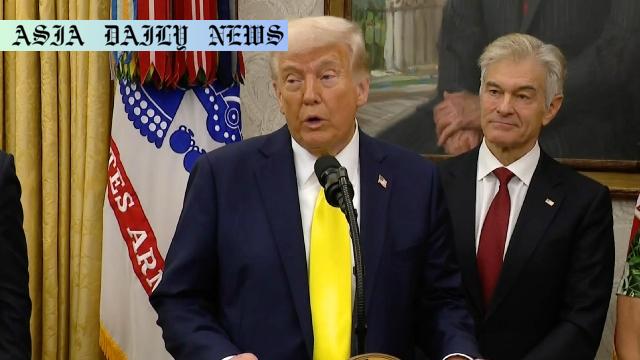Ukraine Conflict: Trump emphasizes US may disengage if negotiation efforts between Ukraine and Russia stall.
Trump emphasizes the importance of ending the Ukraine conflict through negotiations.
The US may withdraw from talks if progress toward peace remains unattainable.
Secretary Rubio reinforces the urgency for a clear resolution path.

Trump’s Firm Stance on Ukraine Peace
During a recent press conference held at the White House, President Donald Trump reinforced his commitment to pursuing dialogue to resolve the ongoing conflict between Ukraine and Russia. While stressing the United States’ desire to see a peaceful resolution, Trump made it clear that Washington will not remain at the negotiating table indefinitely. If either Kyiv or Moscow impedes the process, Trump remarked, “We’re just going to say, ‘You’re foolish, you’re fools, you’re horrible people,’ and we’re going to just take a pass.” His statement underscores a determined effort to end the protracted conflict while showing an acute awareness of the complexity of such negotiations.
The Role of Secretary Marco Rubio
Adding to Trump’s remarks, Secretary of State Marco Rubio clarified the administration’s position earlier in the day. Rubio noted that prolonged negotiations without tangible progress would not be tolerated. Speaking in a press interaction, he revealed that Trump might choose to discontinue diplomatic efforts if achieving peace seems unattainable. “Well, we’re done,” Rubio said, highlighting the administration’s willingness to take a step back if both parties fail to cooperate. Rubio’s discussion with NATO Secretary General Mark Rutte reflected similar sentiments, with a clear warning that U.S. endeavors could be withdrawn if no actionable peace roadmap emerged soon.
Implications for Global Politics
The United States’ evolving approach to peace efforts in Ukraine signals several critical geopolitical considerations. First, it underscores Washington’s focus on leveraging diplomacy while maintaining a firm stance against stagnation. Second, it reflects a broader policy framework aimed at demonstrating to global allies and adversaries alike that the U.S. values results-driven negotiations. The firm yet open dialogue pursued by the Trump administration carries implications not just for Ukraine and Russia but also for the NATO alliance and U.S. foreign policy. However, pulling out of talks prematurely could have complex consequences, including strained relations with European partners and emboldened aggression from opposing parties.
Challenges to Securing Peace
The complexities of the Ukraine conflict remain significant roadblocks to peace. Both Kyiv and Moscow face immense domestic and geopolitical pressures that complicate negotiations. Ukraine, fighting to preserve its sovereignty, demands unwavering international support, while Russia seeks to assert its regional dominance. The Trump administration’s possible pivot toward disengagement risks leaving the conflict unresolved, heightening tensions in Eastern Europe. However, Washington’s insistence on rapid progress could serve to bring the negotiating parties to the table with renewed urgency. Managing these intricate dynamics will require skillful diplomacy and a balanced approach to ensure meaningful results.
Commentary
A Time for Assertive Diplomacy
The ongoing Ukraine conflict has placed intense geopolitical and humanitarian pressures on all involved. President Trump’s recent remarks indicate a measured, if somewhat assertive, approach to breaking the cycles of prolonged negotiation. The inclusion of a firm timeline may encourage quicker resolutions, but can also risk unintended consequences should either party perceive the U.S. as disengaging prematurely. Balancing urgency with flexibility will be key to ensuring that Washington’s efforts remain impactful without alienating allies or escalating tensions.
Rubio’s Role and Its Strategic Importance
Secretary Rubio’s candid statements about the possibility of the United States abandoning negotiations showcase the administration’s resolve for results-driven diplomacy. This stance sends a powerful message to both Ukraine and Russia to take the peace process seriously, though it also poses challenges in maintaining U.S. credibility globally. If peace talks falter and the U.S. does indeed withdraw, it may leave critical gaps for regional players to navigate themselves. This scenario could potentially strengthen Russia’s influence, risking further destabilization in the region. Rubio’s approach, while tactical, must strive to balance firmness with reassurance to NATO allies.
Global and Humanitarian Stakes
Beyond the political implications, the Ukraine conflict carries immense human costs. Civilian casualties, displacement, and disrupted lives continue to devastate communities. Effective peace negotiations are essential, not just for political stability but for addressing these urgent humanitarian needs. The U.S., as a leading global power, holds a responsibility to act as both a mediator and moral authority. Policymakers must remain cognizant of these stakes, ensuring that diplomatic stances align with the broader goal of alleviating suffering and fostering stability.


